

Philo. Le rasoir philosophique. Albert Jacquard - Wikipédia-Mozilla Firefox. Un article de Wikipédia, l'encyclopédie libre.
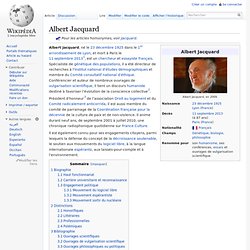
Pour les articles homonymes, voir Jacquard. Emmanuel Todd. Un article de Wikipédia, l'encyclopédie libre.
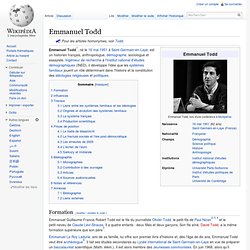
Pour les articles homonymes, voir Todd. Emmanuel Todd. Michel Onfray. Un article de Wikipédia, l'encyclopédie libre.
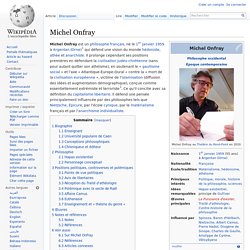
Philo. Philosophy. Gilles deleuze. Samurai. Philosophy. Jean-Jacques Pauvert. Gilbert Simondon. Un article de Wikipédia, l'encyclopédie libre.
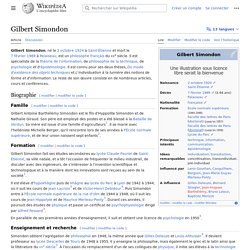
Gilbert Simondon (né le à Saint-Étienne et mort le à Palaiseau) est un philosophe français du XXe siècle. Son œuvre, produite pour l'essentiel entre 1954 et 1968, traite de l'appartenance de l'homme au vivant, de la centralité philosophique du problème de la technique ou encore des nouvelles formes d'aliénation. Biographie[modifier | modifier le code] Gilbert Simondon fait ses études secondaires au lycée de Saint-Étienne, sa ville natale, et a tôt l’occasion de fréquenter le milieu industriel, de discuter avec des ingénieurs, de s’intéresser à l’invention scientifique et technologique et à la manière dont les innovations sont reçues au sein de la société. En 1955 il devient assistant à l’université de Poitiers.
La dernière partie de sa vie est assombrie par la souffrance psychique, qui le contraint à prendre une retraite anticipée. Pensée[modifier | modifier le code] Publications[modifier | modifier le code] Pour une théorie de la rencontre. Philosophy. Logic. Philo. Filosofía. Home . Madrid Premium. Allegory of the Cave.
Plato realizes that the general run of humankind can think, and speak, etc., without (so far as they acknowledge) any awareness of his realm of Forms.
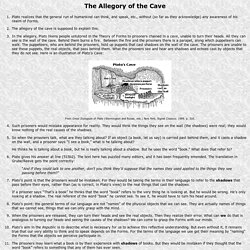
The allegory of the cave is supposed to explain this. In the allegory, Plato likens people untutored in the Theory of Forms to prisoners chained in a cave, unable to turn their heads. All they can see is the wall of the cave. Behind them burns a fire. Between the fire and the prisoners there is a parapet, along which puppeteers can walk. Penseurs. Logical Paradoxes. 11 Most Important Philosophical Quotations. 1.
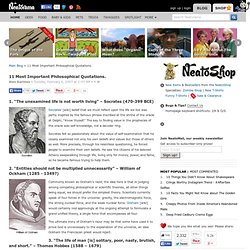
“The unexamined life is not worth living” – Socrates (470-399 BCE) Socrates’ [wiki] belief that we must reflect upon the life we live was partly inspired by the famous phrase inscribed at the shrine of the oracle at Delphi, “Know thyself.” The key to finding value in the prophecies of the oracle was self-knowledge, not a decoder ring. Socrates felt so passionately about the value of self-examination that he closely examined not only his own beliefs and values but those of others as well. More precisely, through his relentless questioning, he forced people to examine their own beliefs. 2.
Commonly known as Ockham’s razor, the idea here is that in judging among competing philosophical or scientific theories, all other things being equal, we should prefer the simplest theory. How To Treat Others: 5 Lessons From an Unknown Author - Global One TV. Five Lessons About How To Treat People -- Author Unknown 1.

First Important Lesson - "Know The Cleaning Lady" During my second month of college, our professor gave us a pop quiz. Philosophy since the Enlightenment, by Roger Jones.
Philosophy Pearlers. Peter D. Klein. Peter David Klein (born 17 September 1940) is a professor of philosophy and chair of the department at Rutgers University, New Jersey.

Peter Klein received a BA at Earlham College, and a PhD from Yale University. He is the author of Certainty: A Refutation of Skepticism (1982) and a variety of articles and reviews addressing issues in epistemology. Klein is widely known for his work on skepticism. His most influential work, however, is on the nature of knowledge, where he has long defended the defeasibility theory. Thebigview.com - Pondering the Big Questions. Western Philosophy.
An Essay by Einstein. "How strange is the lot of us mortals!

Each of us is here for a brief sojourn; for what purpose he knows not, though he sometimes thinks he senses it. But without deeper reflection one knows from daily life that one exists for other people -- first of all for those upon whose smiles and well-being our own happiness is wholly dependent, and then for the many, unknown to us, to whose destinies we are bound by the ties of sympathy. A hundred times every day I remind myself that my inner and outer life are based on the labors of other men, living and dead, and that I must exert myself in order to give in the same measure as I have received and am still receiving...
"I have never looked upon ease and happiness as ends in themselves -- this critical basis I call the ideal of a pigsty. The ideals that have lighted my way, and time after time have given me new courage to face life cheerfully, have been Kindness, Beauty, and Truth. "My political ideal is democracy. Welcome to the Possibilium. Why do humans reason. Philosopie et TIC. Golden Philosophy. Six Vintage-Inspired Animations on Critical Thinking. RWE.org - Complete Works of RWE. GANDHI ONE SPOT COMPLETE INFORMATION WEBSITE. Commentary on Wittgenstein's Philosophical Investigations. Shawver Commentary: This commentary in the pages of this website is not meant to replace your reading of Wittgenstein in the original.
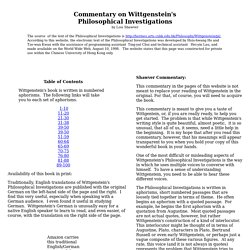
Philosophy, Physics, Mathematics - “Dangerous Knowledge” Welcome to PhilSci-Archive - PhilSci-Archive. A magazine of ideas. : freegan.info. Sri aurobindo. The Martin Luther King Jr. Center for Nonviolent Social Change. Philosophy Experiments. Así habló Zaratustra. Prólogo[editar] 1 [1][editar] Cuando Zaratustra tenía treinta años[2], abandonó su patria y el lago de su patria y fue a las montañas.
Taoism. Gandhiji. Aristotle. Born at Stagira in northern Greece, Aristotle was the most notable product of the educational program devised by Plato; he spent twenty years of his life studying at the Academy. When Plato died, Aristotle returned to his native Macedonia, where he is supposed to have participated in the education of Philip's son, Alexander (the Great). He came back to Athens with Alexander's approval in 335 and established his own school at the Lyceum, spending most of the rest of his life engaged there in research, teaching, and writing. His students acquired the name "peripatetics" from the master's habit of strolling about as he taught. Although the surviving works of Aristotle probably represent only a fragment of the whole, they include his investigations of an amazing range of subjects, from logic, philosophy, and ethics to physics, biology, psychology, politics, and rhetoric.
But on Aristotle's view, the lives of individual human beings are invariably linked together in a social context. Socrates. Spirtual Enligtenment. Veritas in Latin Middle Ages from Augustine to Paul of Venice. "Almost everyone knows that it was Aristotle who proposed the classical (or correspondence) theory of truth for the first time. However, the fact that his writings contain different and often mutually non-equivalent statements on truth is less recognized.
This is a sample of Aristotelian explanations concerning the concept of truth (.. Www.galactic-server.com/rampa/rahermit3.html. So back to the hermits cave where he told the unbeliveable story to young Lobsang: ….glumly the young monk set about the task of separating the layers of bark. The dark outer skin, coarse and rugged helped to feed the flames. The smooth, greenish-white under layer to be torn into shreds and stuffed into the now-boiling water. Gloomily he tossed in the last lump of tea and jumped high as a splash of boiling water scalded his wrist. Grasping a newly peeled stick he prodded and stirred the mess in the can. The old hermit held out his bowl. Slavoj Žižek interview on NiteBeat. Thus Spake Zarathustra/Part One. [edit] Three metamorphoses of the spirit do I designate to you: now the spirit becometh a camel, the camel a lion, and the lion at last a child. Many heavy things are there for the spirit, the strong load-bearing spirit in which the reverence dwelleth: for the heavy and the heaviest longeth its strength.
History of Philosophy without any gaps. Klein, Peter. PHILOSOPHY POSTERS by Max Temkin. Philosophy is the study of general and fundamental problems, such as those connected with existence, knowledge, values, reason, mind, and language. Philosophy is distinguished from other ways of addressing such problems by its critical, generally systematic approach and its reliance on rational argument. The word “philosophy” comes from the Greek φιλοσοφία (philosophia), which literally means “love of wisdom“. In this case, Max Temkin, the artist, wanted to create posters with quotes that motivated people to think ‘different‘.
Ethics Updates Home Page. Moral theory; relativism; pluralism;. Power (philosophy) In social science and politics, power is the ability to influence or control the behavior of people. The term authority is often used for power perceived as legitimate by the social structure. Complejo (psicología) A&[Internet Encyclopedia of Philosophy]
PHILOSOPHY POSTERS by Max Temkin. Table of Contents. Abduction (Igor Douven) Abelard [Abailard], Peter (Peter King) Abhidharma (Noa Ronkin) abilities (John Maier) Abner of Burgos (Shalom Sadik) Abrabanel, Judah (Aaron Hughes) abstract objects (Gideon Rosen) accidental properties — see essential vs. accidental properties action (George Wilson and Samuel Shpall) action-based theories of perception (Robert Briscoe and Rick Grush) action at a distance — see quantum mechanics: action at a distance in actualism (Christopher Menzel) adaptationism (Steven Hecht Orzack and Patrick Forber) Addams, Jane (Maurice Hamington) Adorno, Theodor W.
(Lambert Zuidervaart) advance directives (Agnieszka Jaworska) Aegidius Romanus — see Giles of Rome Aenesidemus — see skepticism: ancient aesthetic, concept of the (James Shelley) aesthetics aesthetics of the everyday (Yuriko Saito) affirmative action (Robert Fullinwider) Africana Philosophy (Lucius T. Outlaw Jr.) B [jump to top] El mundo de Mafalda. BIBLIOTECA DE FILOSOFIA - shared folder - almacenamiento y uso compartido de archivos gratis. List of unsolved problems in philosophy. This is a list of some of the major unsolved problems in philosophy.
Clearly, unsolved philosophical problems exist in the lay sense (e.g. Diez curiosas anécdotas de famosos filósofos. La entrada que os traigo hoy son diez curiosas y divertidas anécdotas sobre famosos filósofos de todos los tiempos. El desparpajo, despiste, ocurrencias o genialidad de todos ellos hace que la historia esté repleta de divertidísimas anécdotas protagonizadas por estos.
BIBLIOTECA DE FILOSOFIA - shared folder - almacenamiento y uso compartido de archivos gratis. Andy Hamilton - Lecturer in Philosophy, University of Durham. The Death of Postmodernism And Beyond. Articles Alan Kirby says postmodernism is dead and buried. In its place comes a new paradigm of authority and knowledge formed under the pressure of new technologies and contemporary social forces. I have in front of me a module description downloaded from a British university English department’s website. Philosophy since the Enlightenment, by Roger Jones. Raison D'Être. Talking Philosophy. Filosofighters. A&[Internet Encyclopedia of Philosophy] - StumbleUpon. Philosophy of Science Resources. Dialegesthai. Rivista telematica di filosofia. BuddhaNet - Worldwide Buddhist Information and Education Network. History of Philosophy without any gaps. The Logical Fallacies: Welcome. Welcome to PhilSci-Archive - PhilSci-Archive.
Philosophy since the Enlightenment, by Roger Jones. Noesis. The Noesis and Noema William Large.